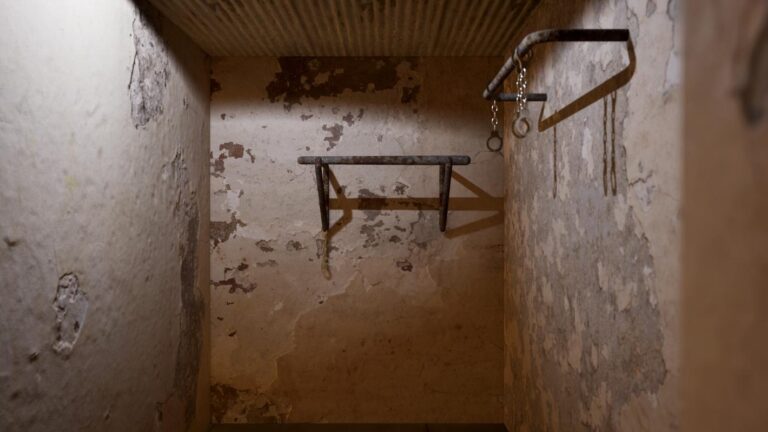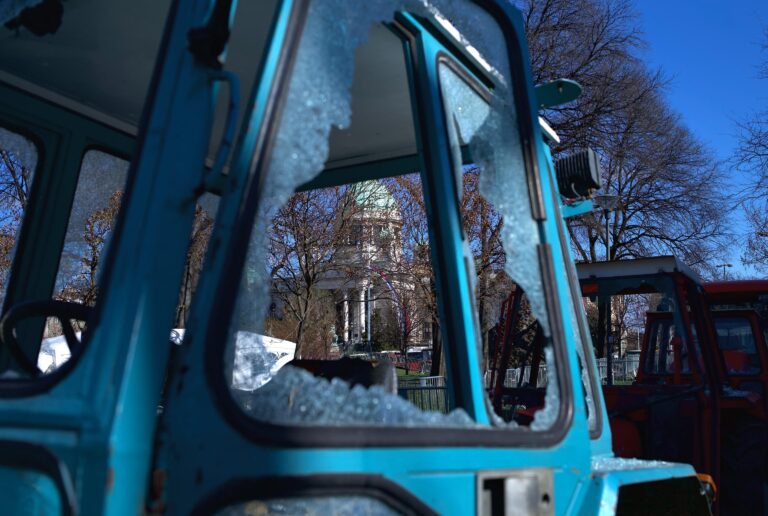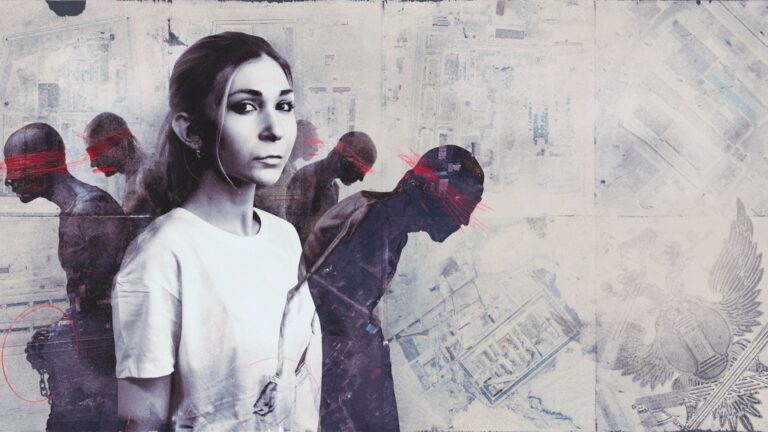- Reading time : 13 min.
Azerbaijan’s business of election observation
Ilham Aliyev overwhelmingly won re-election as president of Azerbaijan on February 7, with more than 92% of the popular vote in an election marred by repression and the arrests of journalists. The regime welcomed election observers from around the world who endorsed Aliyev’s victory. As part of the “Baku Connection,” Forbidden Stories investigated how Azerbaijan manipulates election observers to give this rights-abusing regime an illusion of democracy.
By Eloïse Layan
February 20, 2024
Translated by Phineas Rueckert and Sophie Stuber
Additional reporting: Youssr Youssef (Forbidden Stories), Paciane Rouchon (Forbidden Stories), Sebastian Seibt (France 24).
Azerbaijan’s February 7 elections went smoothly, according to Jessica Mshama, 28, an election observer from Tanzania. Voting in the Caucasus country near the Caspian Sea was the “calmest” she “had ever seen.”
Mshama was one of nearly 800 election observers from 89 countries around the world. She is a rising social media star with more than 100,000 Instagram followers and was named one of Forbes Africa “30 Under 30.” Mshama said she visited five voting booths, seeing undisturbed voting, high participation levels, and a diverse electorate. She told Forbidden Stories that she was “impressed.” In interviews with Azeri media, she called the election “very inspiring.”
Accompanied by other Italian MPs, Naike Gruppioni (second left) faces the Azeri press. Credit: screenshot of the website secki-2024.az
Other observers agreed with Mshama. “Exceptionally organized elections,” Alberto Villa Villegas, a representative from Mexico, said. Nur Jazlan Mohamed, from Malaysia, said that the elections were “up to international standards.” Naike Gruppioni, an Italian MP from the Italia Viva party, went as far to say, “the election process that I observed is an example to many countries, for example to my country, Italy.”
When results were announced the night of the election, incumbent Aliyev was elected with 92.12% of the vote. Aliyev has ruled Azerbaijan with an iron fist for two decades, now entering his 21st year as the leader of the oil-rich, former Soviet republic, which he inherited from his father. His wife, Mehriban, served as vice president for the past seven years.
Despite strong endorsements from supposedly neutral outsiders, critics contended that the Aliyev regime uses election monitoring to clean up its reputation and cover up corruption scandals and human rights abuses. As part of the Baku Connection, Forbidden Stories investigated the murky world of election monitoring in Azerbaijan.
Forbidden Stories and 40 journalists from 15 European media pursued the work of six members of the Azerbaijani independent media outlet, Abzas Media, all of whom were arrested.
They were among the last in the country investigating the abuses of power in the Aliyev regime.
Protect your stories
Are you a journalist under threat because of your reporting? Secure your information with Forbidden Stories.
An international firewall
Cavid Aga, an Azerbaijani critic of the regime, was an observer at the last parliamentary elections in 2020. His experience differed from Mshama’s. Aga said he witnessed five suspicious incidents in a single day, including ballot box stuffing and a so-called “carousel,” where a small group of voters go from bureau to bureau, voting at each one. International observers “are nothing more than the face of government propaganda,” he said.
Aga refused to be an observer again, noting that the two biggest opposition parties, Müsavat and Azerbaijani Popular Front Party, boycotted the election. One of Müsavat’s leaders was arrested in December 2023.
“I may be a pessimist, but there’s nothing to observe,” Aga said.
According to Sociologist Gerald Knaus, head of the European Stability Initiative (ESI), a think-tank on democratic issues in Europe, election observers in Azerbaijan are drawn from two very different pools: professionals, and those who are sometimes paid by the regime. In the past, Azerbaijan has sometimes openly paid these observers, for example via NGOs in Belgium and Germany, Knaus said. Politicians were also invited to Baku.
“They take advantage of the good restaurants, the good hotels, and then say on television that the elections went well,” he said.
An observer from the OSCE mission in 2020 was equally skeptical, speaking to Forbidden Stories under the condition of anonymity. This member of a delegation for the 2020 parliamentary elections described these missions as “not at all serious.”
“They often come with a political agenda, and an unclear methodology,” he said. “Most of the time, they observe only a few polling stations, or a large number of stations in record time.”
Declarations to the press were often used to discredit the results of unbiased external election studies, including those by the OSCE (Organization for Security and Co-operation in Europe), this observer added.
In 2024, the OSCE criticized the elections in Azerbaijan, noting that they occurred in a “restrictive environment” and that “of the six candidates standing for election other than the incumbent, all had supported the President in the recent past.” The organization found irregularities in 7.7% of polling stations, a rate they qualified as “high.” This was lower than in 2018, when 12% of cases were found to be irregular, a “worrying” figure. In 2013, Azerbaijan announced election results a day before polling day.
Maria Debre, a specialist in authoritarian regimes, explained that bringing in conciliatory observers served as an “international firewall.”
“It’s a legitimation of the existing power. It’s a matter of saying to your constituents, ‘Look, these were free elections; look, they took place according to international standards.’ It’s a common mechanism in autocracies” she said.
Twenty years ago, regimes depended on European delegations, but they now have access to a variety of organizations that observe elections.
“The business of electoral observation has developed. The CIS [Commonwealth of Independent States], led by Russia, entered the battle first and contested that the OSCE is a biased organization,” Debre said.
The CIS, which brings together former members of the USSR, said that Azerbaijan’s elections were at an “exemplary level.” Azerbaijan also invited the Shanghai Cooperation Organization, which said that “no violation” was observed, and the Organization of Turkish States.
To be perceived as a democracy, authoritarian regimes are sometimes willing to pay a high price.
Support us so that we can continue investigating
We need your help to expose what the enemies of the press try to keep quiet.
Corrupt Europeans
In April 2018, Yassin Lamaoui’s role as an election observer almost went unnoticed. The only traces of the French man’s trip were a photo and a few statements to the Azeri press, where he was identified as “Lamour,” not “Lamaoui.”
At the time, Lamaoui was the parliamentary assistant to Pierre-Alain Raphan, a former deputy from President Emmanuel Macron’s La Republique En Marche (LREM) Party. Raphan served as the president of the France-Azerbaijan friendship group at the French National Assembly and allegedly proposed that Azerbaijan fund an association called “Alfa” (or the French-Azerbaijani Alliance) for 2.8 million euros a year. Even before the French MP was elected, he was approached through Lamaoui by a consultancy firm called Victory Capital that was commissioned by the Azerbaijani Ambassador to France.
Following French President Emmanuel Macron’s election in 2017, Elchin Amirbayov, then-Azerbaijani ambassador to France, needed contacts in the new president’s party, according to French daily La Lettre. Amirbayov started “recruiting” certain MPs to build his influence in French politics. But with the change of ambassador, the hoped-for money allegedly never materialized. (Forbidden Stories was unable to reach Lamaoui for comment. As for Raphan, he says he “doesn’t remember” his colleague’s trip and “never received any payments from Azerbaijan.”)
In April 2018, Yassin Lamaoui, assistant to MP Pierre-Alain Raphan observed the presidential election in Baku. Credit: screenshot Azertac.
Lamaoui is one of more than 70 “biased observers” identified in Azerbaijan on the website of European Platform for Democratic Elections (EPDE). The NGO calls observers who have been convicted of corruption or who do not follow a rigorous methodology “fake observers.” Some were members of the Council of Europe, while others were invited as “independent observers,” with all expenses paid by Azerbaijan.
For the Azerbaijani government, election observation is just one element in a much broader scheme to recruit allies and buy influence abroad. This strategy was revealed in the “Caviar Diplomacy” scandal in 2012. Knaus, the ESI sociologist, followed by journalists at OCCRP, found that some Council of Europe members were being bought by Azerbaijan. They also discovered that the Council of Europe’s decisions, including votes, were influenced by elected representatives who are now being prosecuted for corruption.
One German representative, MP Eduard Lintner, is accused by the German judiciary of receiving “millions of euros until 2016 through 19 front companies.” He was indicted in December for corruption alongside former MP Axel Fischer, who is alleged to have received a bribe of €21,800 in 2016. The scandal also involved Belgian MP Alain Destexhe, who organized election observation missions in Baku via an association where he allegedly received funds from Lintner.
In Italy, MP Luca Volontè was sentenced in 2021 to four years in prison in a first instance judgment for allegedly receiving 500,000 euros from Azerbaijan between 2012 and 2014. The Court of Appeal acquitted him in 2022, because after the trial, the international corruption crime had surpassed the statute of limitations.
Azerbaijan’s Elkhan Suleymanov, who also sat on the Parliamentary Assembly of the Council of Europe is allegedly behind the slush fund. According to a witness interviewed by the three experts mandated by the Council of Europe to investigate allegations of corruption in 2018, Suleymanov “may have had 30 million euros at his disposal for this ‘dirty lobbying.’” Thirteen parliamentarians were ultimately banned for life from the Council of Europe. At least eight of them observed elections in Azerbaijan.
With other observers, motives are harder to pin down. In 2020, Jean-Luc Reitzer, former member of the French National Assembly from the Haut-Rhin region, observed the legislative elections in Baku. While there, he was quoted by a Russian newspaper as saying that Azerbaijan was “gradually following the path of democratization.”
Contacted by phone, he was slow to recall this mission to Baku and said that a bout of Covid put him into a coma a few weeks after his trip. He also claimed to not remember the European Centre for Democracy and Human Rights (ECDHR) or its then-president, Polish citizen Janusz Niedźwiecki, despite the fact that this organization had invited Reitzer to be an election observer, according to the consortium’s information.
A photo posted on Facebook in May 2019 shows Reitzer and Niedźwiecki together in Baku. Niedźwiecki was arrested in 2021 and has been on trial since February for “espionage and foreign intelligence” on behalf of the Kremlin.
Let’s keep in touch!
Hotels, Luxury Stores and Shopping Malls
The newspaper is run by editor Yannick Urrien, an admirer of Azerbaijan. Guerriau was invited by the ambassador of Azerbaijan to observe the 2020 legislative elections. His trip was documented in a press conference, where he spoke in front of a dozen microphones. This trip, however, did not appear in his travel declarations to the Senate. (Guerriau did not respond to our requests for comment.)
Yves Métaireau, then-mayor of La Baule, did release some details of this 2020 mission. Métaireau was in Azerbaijan at the same time as Guerriau, traveling with Urrien.
In his book, Les tribulations d’un maire de France, the former mayor described his trip as if it were a touristic escapade.
“We were very well received in Baku, the capital, and were provided with cars and drivers to discover the city and the region,” he wrote. In Baku “you can find some very nice hotels, luxury stores and shopping malls,” he added.
Métaireau also visited vineyards 150 kilometers from Baku owned by Vice President Mehriban Aliyeva. (Contacted by telephone, Yves Métaireau was “not very keen to talk,” but pointed out that at the time “France did not criticize the country.”)
Urrien, for his part, claimed to be “curious” about the country. Urrien has many contacts in Paris and abroad, and is a known friend of Thierry Mariani, an MP from the far-right National Rally party and longtime member of the France-Azerbaijan group in the National Assembly.
Urrien described Azerbaijan as a “secular” country, where “women are free,” adding that criticism of Azerbaijan’s democratic veneer would be “counter-productive.”
“They’re moving in the right direction, and we’re helping things evolve by listening, communicating and cooperating,” he said.
Despite his admiration for this “modern” country, Urrien did not observe the 2024 elections.
Battle at the Council of Europe
Despite the connections between certain French elected representatives and the Aliyev regime, for the first time in at least 10 years, no one French was invited this year. French polling institute Opinion Way was also absent.
Since at least 2015, Bruno Jeanbart, now the institute’s vice president, has traveled to Azerbaijan to announce in-person exit polls. As with election observers, the pro-Aliyev press used his statements as a guarantee that democratic standards were being respected.
When asked about the risk of “democracy-washing,” Jeanbart replied, “It’s a question that can indeed arise. It arises even in democratic countries. Here in France, we are regularly criticized for the way our data is used by the media and by politicians.”
This year, he told Forbidden Stories that he “had no contact to work there.”. Instead, American firm Oracle Advisory Group carried out exit polls, led by Vlada Galan, who describes herself on X (formerly Twitter) as an “election expert” and “lobbyist.” (Oracle Advisory told Forbidden Stories that it was not an international observer for the 7 February 2024 Azerbaijani elections, but conducted a “scientific exit poll in which it interviewed 63,000 voters across 500 precincts in 40 constituencies on election day.”)
Azerbaijan also turned down the Council of Europe delegation, against a backdrop of tensions linked to the takeover of Nagorno-Karabakh, the breakaway region between Armenia and Azerbaijan.
“They don’t invite us and they do it on purpose because they expect criticism from us,” Frank Schwabe, head of the German delegation at PACE (Parliamentary Assembly of the Council of Europe), said. “It is, however, an obligation of member countries to authorize rapporteurs for an electoral observation mission.”
For the Council of Europe, this was one affront too many. On January 24, 2024, the Council voted to temporarily exclude the Azerbaijan delegation from its Parliamentary Assembly.
Azerbaijan’s break with France was direct.
“I’m not going to mince words. We have a crisis in our bilateral relations,” H.E. Leyla Abdullayeva, Azerbaijan’s ambassador to France, said. “With Presidents Mitterrand, Chirac and Sarkozy, we had good relations, but today, we regret France’s position.”
Since the beginning of the war in Nagorno-Karabakh in September 2020, and the bombing of the region in September 2023, relations between the two countries have been strained. The agreement on the sale of defensive equipment to Armenia last October by France and the expulsion of two French diplomats from Azerbaijan in December exacerbated tensions. At the French National Assembly, it is no longer politically savvy to appear close to Baku, and the friendship group has been abandoned.
Caviar diplomacy seems to be a thing of the past.
#BoycottParis2024
Viginum, the French government’s agency that fights against foreign digital influence, investigated the video and traced it back to two US-based PR firms owned by Azerbaijani entrepreneur Orkhan Rzayev. Abdullayeva, the Azerbaijani ambassador, rejected “all accusations that the government is behind this.”
But the rhetoric in the clip echoes President Aliyev, who has sought to portray France as a country that falsely presents itself as a defender of human rights.
Last July, the Baku Initiative Group was created on the sidelines of the Non-Aligned Movement—a forum to advance the interests of developing countries that Azerbaijan presided over from 2019 until the beginning of 2024. The initiative group brings together independence leaders from Kanak, a region of New Caledonia, and from Guadeloupe, Guyana, and others. Yet its director is Azerbaijani and its offices are in Baku.
In a message addressed to members of the Baku Initiative Group, President Aliyev took direct aim at France: “Some countries continue to pursue colonialism. Among those, the foremost one is France.”
Online, Azerbaijan has rallied around Corsican independence fighters decrying the “policemen of Macron’s dictatorship,” and relayed information about unrest in Mayotte with the hashtags #MayotteEnColère (Mayotte Is Angry) and #EtatMenteurFrance (France State of Lies). In the middle of this firestorm, a video shows La Baule journalist Urrien congratulating Azerbaijan for obtaining “victory and justice” in Nagorno-Karabakh.
Urrien is familiar with Baku’s influencers. He stated Hikmet Hajiev, an influential advisor to President Aliyev, invited him to a conference where he denounced the massacre of French separatist groups. Although he “suspects” that the Baku group is merely deployed as a means to attack France, which he “regrets as a patriot,” Urrien said that the attacks were “legitimate.”
“France had it coming,” he said.
Some still believe in Azerbaijan’s democratic aspirations. Mshama, from Tanzania, said that the country “has been a champion” in supporting the youth of the Non-Aligned Movement. In addition to the Baku Initiative Group, Azerbaijan is the driving force behind the NAM Youth movement. This February, Jessica Mshama and around twenty other young people were invited to the Azerbaijani capital for a Capital Building meeting. They took the opportunity to observe the elections. (“A coincidence of timing,” a young representative from Malawi said.)
The day before the elections, NAM members received a short training course and a booklet on election observation, according to Mshama. Nam Youth’s statement to the press was unambiguous : “The elections were open, transparent, free, and fair”.
À lire aussi













